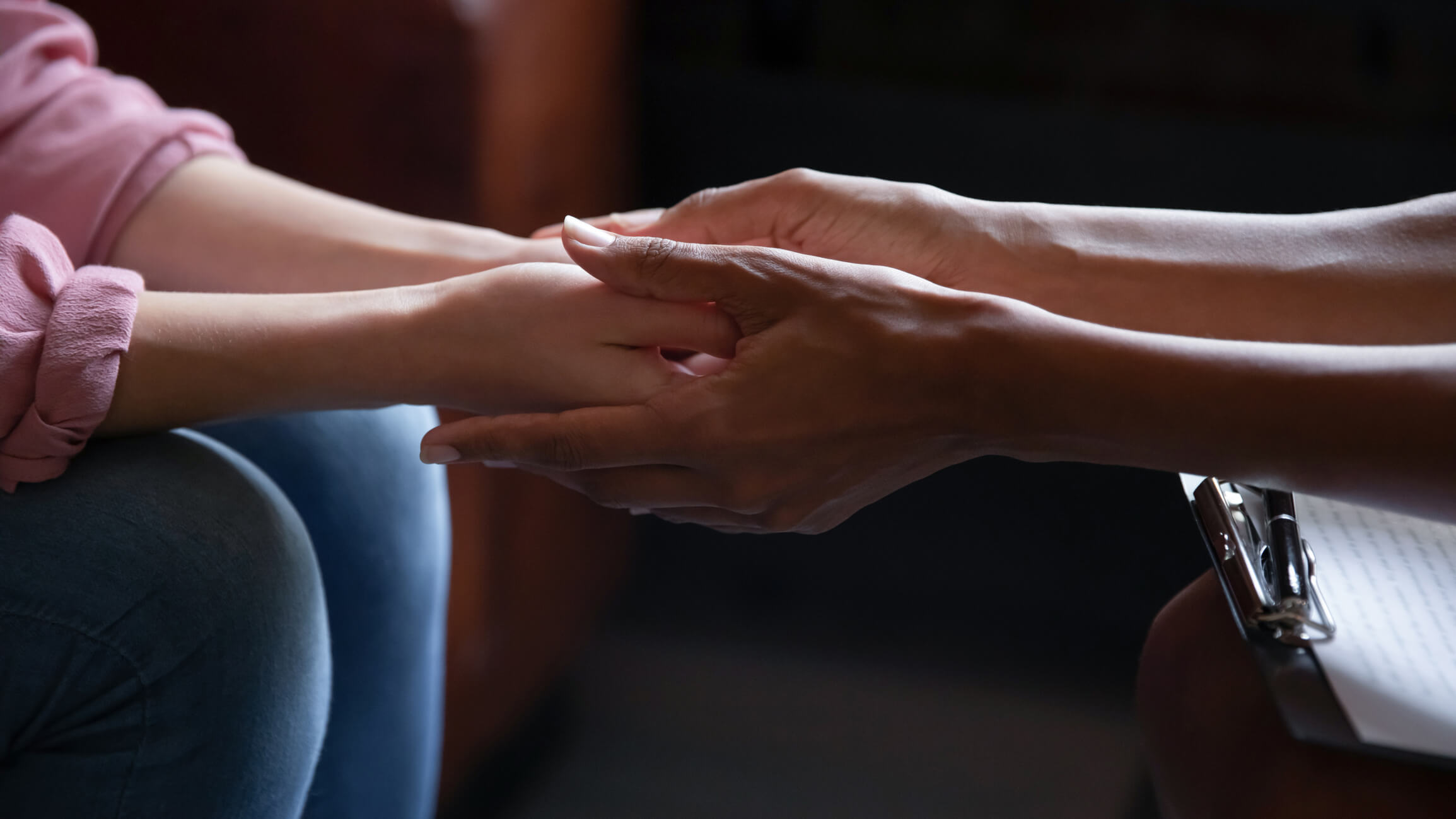What’s the relationship between pornography and trauma? A look into the extensive research on this subject reveals a complex answer. Exposure to porn can traumatize the viewer. At the same time, addictive patterns of pornography use often find their roots in traumatic experiences of the past.
Let’s untangle the threads connecting pornography and trauma and see what we can learn.
Exposure to porn can be traumatizing.
Research now shows that the average age when children are first exposed to porn is between 9 and 10 years old. Think about it—children still years from puberty are seeing sexually explicit content. What does this do to their minds?
Dr. Caroline Giroux, a professor at UC Davis and practicing psychiatrist, minces no words about the effect of pornography on young children. “In my opinion, it is a form of sexual trauma, just like witnessing a car accident or parental domestic abuse can be traumatic for the observer.”1
After recounting a number of her cases involving children who had been exposed to porn, Giroux says:
“Exposing children to pornography should be forbidden and better regulated, as it is violating their spiritual boundaries and evolving beliefs around body, sexual development and intimate relationships, in a similar way that direct sexual abuse on their body does. If this trauma is not identified and processed promptly, the survivor runs the risk of reenacting as an attempt to resolve what once left him or her powerless, or of even engaging in similar criminal behaviors.”2
We need to protect our children from pornography as much as possible. But as we’ve written elsewhere, it’s not a matter of “if” but “when.” Still, this shouldn’t cause dismay. While early exposure to pornography can be traumatizing, the effects can be mitigated if they have someone to talk to.
Even more important than trying to prevent exposure, we need to prepare our children to live in a pornified culture and teach them the importance of talking to us when they see something they shouldn’t!
Neuroscience of porn-related brain trauma.
Addiction research has long-established the similarity between the brains of substance abusers and victims of traumatic injury. However, Dr. Hilton has noted the same commonalities in the brains of porn addicts.
Looking at data from two brain studies, Dr. Hilton concludes, “[A] sexual compulsion can cause physical, anatomic change in the brain, the hallmark of brain addiction.”3
This means that even aside from psychological trauma, as in the case of early exposure to pornography, compulsive porn use can literally injure the brain. For more details on how porn affects the brain, check out our article on Brain Chemicals and Porn: How Porn Affects Your Brain.
Past trauma shapes pornographic preferences.
So far, we’ve looked at the ways pornography itself traumatizes, whether psychologically or neurologically. However, we need to focus on another important consideration: how past trauma—related or unrelated to pornography—impacts porn habits.
Dr. Mark Laaser writes about those who struggle with a sexual addiction like pornography:
“[They] come from families in which the dynamics are mostly unhealthy and abusive. The abuse has led them to feel shame in unhealthy ways. Their parents and other family members have modeled many of the self-destructive strategies addicts use to cope with abuse and shame.”4
This becomes especially important when dealing with compulsive porn use, or someone who has tried repeatedly to stop watching porn but finds themselves unable to quit. Jay Stringer has conducted significant research into the relationship between a person’s present-day pornography use and past trauma. He found that pornography users scored 24% higher on his sexual abuse scale than non-pornography users.5 This indicates that the trauma suffered by an individual leads to struggles with pornography later in life.
The experience of trauma makes a person more vulnerable to the allure of pornography. Not only that, but Stringer has found that abuse and traumatizing experiences can actually shape a person’s pornographic preferences:
“Pornography often involves themes of humiliation, violence, and emotional enmeshment because the sex industry knows that porn users who have endured these traumas will be aroused by the eroticizing of these traumas later in life… the specifics of our sexual brokenness reveal the very stories of trauma we need to heal from.”6
Pornography and Betrayal Trauma
We’ve seen that watching porn can be traumatizing for the viewer and that the viewer may be influenced in their pornography use by past traumatic experiences. But the impact of pornography goes beyond the person who watches it. A third way in which pornography connects with trauma is the experience of betrayal trauma, particularly by the spouse of someone who watches porn.
Dr. Kevin Skinner, the author of Treating Pornography Addiction, writes, “After conducting research for more than ten years and with more than 3,000 individuals, I can confidently say trauma is very common in women and men who discover their partner’s secret sexual behaviors.”
As we discuss in our series for couples, Restored Vows, one counselor found that 70% of the spouses in her care fit the criteria for post-traumatic stress disorder. If a person’s pornography use began with traumatizing exposure to porn that shaped their desire for it, and that pornography habit then traumatizes a spouse, we can see how interwoven the threads are. In fact, there have been reported cases where someone discovers their spouse’s porn, and the trauma of this experience—not to mention curiosity—leads that person to develop a compulsive porn habit as well.
Moving Past Trauma
This complex relationship with trauma can seem daunting, whether it’s pornography in your own life or you’re trying to help someone else who struggles. But these challenges do not make it impossible to overcome. To deal with trauma, we first need to understand that it’s a factor and how it has impacted our lives. Qualified counseling is often an important part of this process. But understanding alone isn’t enough.
In The Body Keeps the Score, trauma researcher Bessel van der Kolk points out that “nobody can ‘treat’ a war, or abuse, rape, molestation, or any other horrendous event, for that matter; what has happened cannot be undone.”7 We might add to that list pornography; it can’t be unwatched.
However, van der Kolk does offer a helpful path forward from the effects of trauma in our lives.
- Find ways to become calm and focused.
- Learn to maintain calm in response to triggering images, thoughts, sounds, or physical sensations.
- Find a way to be fully alive in the present and engaged with the people around you.
- Don’t keep secrets, including secrets about the way you’ve dealt with the trauma.
These steps can only happen in the context of relationships. “When we are terrified, nothing calms us down like the reassuring voice or the firm embrace of someone we trust.”8
1 Caroline Giroux, “Early exposure to pornography: a form of sexual trauma,” Journal of Psychiatry Reform 10 (2021). Accessed at https://journalofpsychiatryreform.com/2021/12/07/early-exposure-to-pornography-a-form-of-sexual-trauma/#:~:text=In%20summary%2C%20exposure%20to%20pornography,sexuality%20and%20even%20suicidal%20attempts.
2 Giroux, “Early exposure to pornography.”
3 Donald L. Hilton and Clark Watts, “Pornography addiction: A neuroscience perspective,” Surgical Neurology International 2 (2011). doi: 10.4103/2152-7806.76977.
4 Mark Laaser, Healing the Wounds of Sexual Addiction (Grand Rapids, MI: Zondervan, 2004), 109.
5 Jay Stringer, Unwanted: How Sexual Brokenness Reveals Our Way to Healing (Colorado Springs, CO: NavPress, 2018), 67.
6 Stringer, Unwanted, 60.
7Bessel van der Kolk, Body Keeps the Score (New York: Penguin, 2015), 205.
8 van der Kolk, Body Keeps the Score, 212.








Well you have some great points
I disagree with the THEORY of early pornography exposure as “trauma.” Rather, in my husband’s case, it’s very much more like he was exposed to a vast array of candy at age 7, and discovered he VASTLY preferred the taste of candy to broccoli. He thereafter repeatedly sought the transcendantly blissful taste of candy to broccoli never once choosing the broccoli instead. I mean, why would he, right???